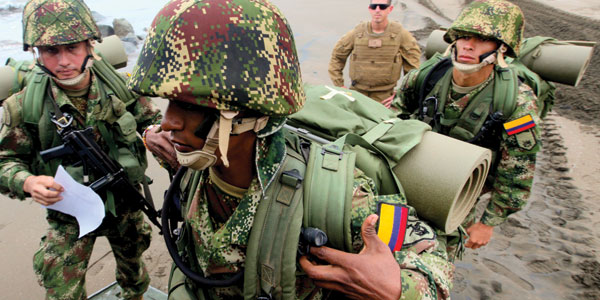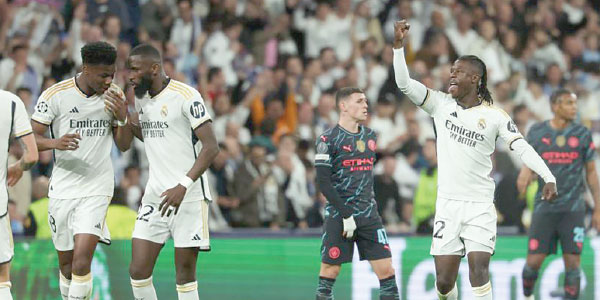
(Para mis amigos colombianos, que no han tenido un solo día de paz en sus vidas.)
“En esta guerra no hubo vencedores ni vencidos”, dijo hace unos días Timochenko, uno de los líderes de las Fuerzas Armadas Revolucionarias de Colombia, o FARC. Y lo primero que pensé fue: qué desperdicio de vidas y de tiempo.
Llevan 52 años en guerra y 220 mil muertos (según el Centro Nacional de Memoria Histórica) y ¿hasta ahora se dan cuenta de que no sirvió para nada?
Pudieron haber parado la guerra al primer año, a los 10, o incluso cuando ya llevaban 40 años luchando. Pero siguieron peleando con la esperanza, supongo, de que en algún momento destrozarían a su enemigo. Eso nunca pasó.
En varios de mis viajes a Colombia durante las últimas tres décadas, recuerdo haber regresado con la misma conclusión: Los guerrilleros nunca le podrán ganar al ejército, y los soldados tampoco podrán vencer a las guerrillas. Incluso en la época de Álvaro Uribe — cuando a un altísimo costo se redujo el número de guerrilleros — los colombianos nunca estuvieron cerca del fin de la guerra.
Por eso, ahora que la posibilidad de paz se acerca, espero que no la desperdicien. Los colombianos decidirán en un referéndum, el próximo 2 de octubre, si ratifican los acuerdos de paz entre las guerrillas de las FARC y el gobierno del presidente Juan Manuel Santos. Es una oportunidad histórica, y una de las mejores noticias que hemos tenido en América Latina.
“Después de la paz comienza lo difícil: la construcción de esa paz”, dijo el presidente Santos hace poco ante Naciones Unidas. Tiene razón.
Lo más fácil sería seguir peleando. Las inercias y los resentimientos están bien aceitados. Las dos partes han mandado a pelear a sus niños y jóvenes, y esa es la fórmula perfecta para transmitir el odio de generación en generación. ¿Quién no quiere vengar la muerte de un hijo o una hija, de un padre, una madre o un hermano?
Es imposible ponerse en el lugar de un padre que perdió a su hijo o de los niños que crecieron solos por el secuestro de su madre. Estoy seguro que el dolor es insoportable, paralizante y que nunca desaparece por completo. Pero sólo desearía que casos como esos no se volvieran a repetir. Es todo. La paz les da esa oportunidad. La guerra no.
“¿Hay una manera de liberar a los seres humanos de la fatalidad de la guerra?” le preguntó una vez en una carta en 1932 el científico Albert Einstein al doctor Sigmund Freud. “¿Cómo es posible que las masas se dejen enardecer hasta llegar al delirio y la autodestrucción?”
La primera respuesta de Freud a Einstein, también en una carta, fue desalentadora. “En principio, pues, los conflictos de intereses entre los seres humanos se solucionan mediante el recurso a la violencia”, escribió Freud. “Así sucede en todo el reino animal, del cual el hombre no habría de excluirse”. Pero después nos da la solución a las guerras. “La violencia es vencida por la unión: el poder de los unidos representa ahora el derecho, que se opone a la violencia del individuo aislado”, concluye Freud.
Eso es precisamente lo que está pasando en Colombia. Es el poder de los unidos; es la unión de los enemigos que deciden dejar de serlo. Y ese acuerdo negociado en Cuba durante cuatro años entre los antiguos opositores da lugar a nuevas reglas.
La paz va a doler. Sí, sé que será repugnante que un asesino camine, impune, por las calles de Santa Marta o que un exsecuestrador viva a sólo cuadras de una de sus víctimas en Bogotá. Los crímenes contra la humanidad no prescriben y deben ser, siempre, procesados. Pero habrá otras violaciones a los derechos humanos, igual de trágicas para las víctimas o sus familiares, que no serán perseguidas bajo los acuerdos de paz o que se perderán en el olvido.
Al final, sólo una comisión de la verdad, creada en un momento más propicio, podrá poner punto final a más de cinco décadas de abusos. Si la verdad es lo primero que se pierde en una guerra, sólo la paz podrá regresar a Colombia el estado de ánimo necesario para ver hacia atrás, con calma y justicia.
Me siguen resonando las palabras de Timochenko. Que en esta guerra entre hermanos y vecinos nadie ganó y nadie perdió. Cuántas vidas perdidas en vano. Qué guerra tan inútil y absurda.
(Jorge Ramos, periodista ganador del Emmy, es el principal director de noticias de Univision Network. Ramos, nacido en México, es autor de nueve libros de grandes ventas, el más reciente de los cuales es “A Country for All: An Immigrant Manifesto”.)
(¿Tiene algún comentario o pregunta para Jorge Ramos? Envié un correo electrónico a Jorge.Ramos@nytimes.com. Por favor incluya su nombre, ciudad y país.)
______________________________________________________________________________________________________________
War Is Easy
By Jorge Ramos
(For my friends in Colombia, who have never known a day of peace.)
“In this war, there were neither winners nor losers,” said Timochenko, one of the leaders of the Revolutionary Armed Forces of Colombia, after a peace deal was announced this summer between FARC and the Colombian government.
My first reaction upon reading those words from Timochenko (the nom de guerre of Rodrigo Londoño) was sorrow — so many lives lost, so many years wasted. Colombia’s leftist rebels and the government were engaged in a brutal civil war for five decades, during which 220,000 people were killed, according to Colombia’s National Center for Historical Memory. And only now is the realization beginning to set in that this long conflict was for nothing.
This war could have been stopped after the first year, or after 10 years, or after 40. But both sides kept fighting, steadfast in their belief that the other side would eventually fall. But that never happened.
I’ve traveled to Colombia several times over the last 30 years, and every time I’ve returned with the same conclusion: The guerrillas will never be able to defeat the army, and the army will never be able to defeat the guerrillas. Colombia has never been close to ending the war — even after President Alvaro Uribe, in office from 2002-2010, launched large-scale security operations to crack down on the guerrillas.
Now a real peace is within reach, and I hope that both sides don’t waste this momentous opportunity. The deal has been signed and endorsed by FARC leaders and President Juan Manuel Santos’ administration, and Colombians will vote on whether to ratify the agreement in a referendum on Oct. 2. This laying-down-of-arms is some of the best news that’s come out of Latin America in a long time.
Santos, in New York recently for the U.N. General Assembly, commented that “after peace, the hard part begins — building on that peace.” He’s right. It would be much easier to keep fighting. The inertia of decades of war, along with deep-seated resentments, will be hard to overcome. Both sides have sent many young people to fight. Understandably, animosity toward the “enemy” and a desire for vengeance have been passed from one generation to the next. Who wouldn’t want to avenge the death of a son or daughter, father or mother, brother or sister?
For countless Colombians, the pain of losing a loved one will never disappear. All we can do now is hope that a war like this never happens again. Peace, not conflict, allows for that possibility.
In 1932, Albert Einstein wrote a letter to Sigmund Freud and posed these questions: “Is there any way of delivering mankind from the menace of war? … How is it these devices succeed so well in rousing men to such wild enthusiasm, even to sacrifice their lives?”
Freud’s response was a bit disheartening: “It is a general principle … that conflicts of interest between men are settled by the use of violence. This is true of the whole animal kingdom, from which men have no business to exclude themselves.” But Freud also posited that war could be averted. “Violence could be broken by union, and the power of those who were united now represented law in contrast to the violence of the single individual.”
In Colombia, such union can indeed break the cycle of violence so long as the enemies can put aside their hatred. Peace will be painful. Seeing a murderer walk free in the streets of Santa Marta will spark outrage. It will be hard to accept that a former kidnapper might be living a few blocks away from one of his victims in Bogota. Without a doubt, crimes and human-rights violations will go unprosecuted after the peace agreement goes into effect.
That’s why a truth commission should be set up in Colombia in the near future to deal with abuses on both sides. If truth is the first casualty in a war, peace can resurrect it. Someday Colombia will have the presence of mind required to address its past with a sense of fairness and justice.
Until then, Timochenko’s words will continue to resound. In a half-century of war among brothers and neighbors, nobody won, and nobody lost. How absurd.
(Jorge Ramos, an Emmy Award-winning journalist, is a news anchor on Univision and the host of “America With Jorge Ramos” on Fusion. Originally from Mexico and now based in Florida, Ramos is the author of several best-selling books. His latest is “Take a Stand: Lessons From Rebels.” Email him at jorge.ramos@nytimes.com.)









